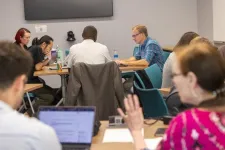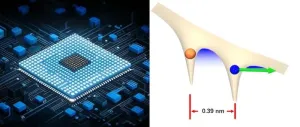(Press-News.org) The Institute for Trustworthy AI in Law & Society (TRAILS) has unveiled an inaugural round of seed grants designed to integrate a greater diversity of stakeholders into the artificial intelligence (AI) development and governance lifecycle, ultimately creating positive feedback loops to improve trustworthiness, accessibility and efficacy in AI-infused systems.
The eight grants announced on January 24, 2024—ranging from $100K to $150K apiece and totaling just over $1.5 million—were awarded to interdisciplinary teams of faculty associated with the institute. Funded projects include developing AI chatbots to assist with smoking cessation, designing animal-like robots that can improve autism-specific support at home, and exploring how people use and rely upon AI-generated language translation systems.
All eight projects fall under the broader mission of TRAILS, which is to transform the practice of AI from one driven primarily by technological innovation to one that is driven by ethics, human rights, and input and feedback from communities whose voices have previously been marginalized.
“At the speed with which AI is developing, our seed grant program will enable us to keep pace—or even stay one step ahead—by incentivizing cutting-edge research and scholarship that spans AI design, development and governance,” said Hal Daumé III, a professor of computer science at the University of Maryland who is the director of TRAILS.
After TRAILS was launched in May 2023 with a $20 million award from the National Science Foundation (NSF) and the National Institute of Standards and Technology (NIST), lead faculty met to brainstorm how the institute could best move forward with research, innovation and outreach that would have a meaningful impact.
They determined a seed grant program could quickly leverage the wide range of academic talent at TRAILS’ four primary institutions. This includes the University of Maryland’s expertise in computing and human-computer interaction; George Washington University’s strengths in systems engineering and AI as it relates to law and governance; Morgan State University’s work in addressing bias and inequity in AI; and Cornell University’s research in human behavior and decision-making.
“NIST and NSF's support of TRAILS enables us to create a structured mechanism to reach across academic and institutional boundaries in search of innovative solutions,” said David Broniatowski, an associate professor of engineering management and systems engineering at George Washington University who leads TRAILS activities on the GW campus. “Seed funding from TRAILS will enable multidisciplinary teams to identify opportunities for their research to have impact, and to build the case for even larger, multi-institutional efforts.”
Further discussions were held at a TRAILS faculty retreat to identify seed grant guidelines and collaborative themes that mirror TRAILS’ primary research thrusts—participatory design, methods and metrics, evaluating trust, and participatory governance.
“Some of the funded projects are taking a fresh look at ideas we may have already been working on individually, and others are taking an entirely new approach to timely, pressing issues involving AI and machine learning,” said Virginia Byrne, an assistant professor of higher education & student affairs at Morgan State who is leading TRAILS activities on that campus and who served on the seed grant review committee.
A second round of seed funding will be announced later this year, said Darren Cambridge, who was recently hired as managing director of TRAILS to lead its day-to-day operations.
Projects selected in the first round are eligible for a renewal, while other TRAILS faculty—or any faculty member at the four primary TRAILS institutions—can submit new proposals for consideration, Cambridge said.
Ultimately, the seed funding program is expected to strengthen and incentivize other TRAILS activities that are now taking shape, including K–12 education and outreach programs, AI policy seminars and workshops on Capitol Hill, and multiple postdoc opportunities for early-career researchers.
“We want TRAILS to be the ‘go-to’ resource for educators, policymakers and others who are seeking answers and solutions on how to build, manage and use AI systems that will benefit all of society,” Cambridge said.
The eight projects selected for the first round of TRAILS seed-funding are:
Chung Hyuk Park and Zoe Szajnfarber from GW and Hernisa Kacorri from UMD aim to improve the support infrastructure and access to quality care for families of autistic children. Early interventions are strongly correlated with positive outcomes, while provider shortages and financial burdens have raised challenges—particularly for families without sufficient resources and experience. The researchers will develop novel parent-robot teaming for the home, advance the assistive technology, and assess the impact of teaming to promote more trust in human-robot collaborative settings.
Soheil Feizi from UMD and Robert Brauneis from GW will investigate various issues surrounding text-to-image generative AI models like Stable Diffusion, DALL-E 2, and Midjourney, focusing on myriad legal, aesthetic and computational aspects that are currently unresolved. A key question is how copyright law might adapt if these tools create works in an artist's style. The team will explore how generative AI models represent individual artists' styles, and whether those representations are complex and distinctive enough to form stable objects of protection. The researchers will also explore legal and technical questions to determine if specific artworks, especially rare and unique ones, have already been used to train AI models.
Huaishu Peng and Ge Gao from UMD will work with Malte Jung from Cornell to increase trust-building in embodied AI systems, which bridge the gap between computers and human physical senses. Specifically, the researchers will explore embodied AI systems in the form of miniaturized on-body or desktop robotic systems that can enable the exchange of nonverbal cues between blind and sighted individuals, an essential component of efficient collaboration. The researchers will also examine multiple factors—both physical and mental—in order to gain a deeper understanding of both groups’ values related to teamwork facilitated by embodied AI.
Marine Carpuat and Ge Gao from UMD will explore “mental models”—how humans perceive things—for language translation systems used by millions of people daily. They will focus on how individuals, depending on their language fluency and familiarity with the technology, make sense of their “error boundary”—that is, deciding whether an AI-generated translation is correct or incorrect. The team will also develop innovative techniques to teach users how to improve their mental models as they interact with machine translation systems.
Hal Daumé III, Furong Huang and Zubin Jelveh from UMD and Donald Braman from GW will propose new philosophies grounded in law to conceptualize, evaluate and achieve “effort-aware fairness,” which involves algorithms for determining whether an individual or a group of individuals is discriminated against in terms of equality of effort. The researchers will develop new metrics, evaluate fairness of datasets, and design novel algorithms that enable AI auditors to uncover and potentially correct unfair decisions.
Lorien Abroms and David Broniatowski from GW will recruit smokers to study the reliability of using generative chatbots, such as ChatGPT, as the basis for a digital smoking cessation program. Additional work will examine the acceptability by smokers and their perceptions of trust in using this rapidly evolving technology for help to quit smoking. The researchers hope their study will directly inform future digital interventions for smoking cessation and/or modifying other health behaviors.
Adam Aviv from GW and Michelle Mazurek from UMD will examine bias, unfairness and untruths such as sexism, racism and other forms of misrepresentation that come out of certain AI and machine learning systems. Though some systems have public warnings of potential biases, the researchers want to explore how users understand these warnings, if they recognize how biases may manifest themselves in the AI-generated responses, and how users attempt to expose, mitigate and manage potentially biased responses.
Susan Ariel Aaronson and David Broniatowski from GW plan to create a prototype of a searchable, easy-to-use website to enable policymakers to better utilize academic research related to trustworthy and participatory AI. The team will analyze research publications by TRAILS-affiliated researchers to ascertain which ones may have policy implications. Then, each relevant publication will be summarized and categorized by research questions, issues, keywords, and relevant policymaking uses. The resulting database prototype will enable the researchers to test the utility of this resource for policymakers over time.
END
TRAILS AI Institute announces first round of Seed Funding
The eight funded projects, totaling just over $1.5 million, will advance cutting-edge research and scholarship that spans AI design, development and governance.
2024-01-24
ELSE PRESS RELEASES FROM THIS DATE:
Cognitive behavioral therapy alters brain activity in children with anxiety
2024-01-24
Researchers at the National Institutes of Health have found overactivation in many brain regions, including the frontal and parietal lobes and the amygdala, in unmedicated children with anxiety disorders. They also showed that treatment with cognitive behavioral therapy (CBT) led to improvements in clinical symptoms and brain functioning. The findings illuminate the brain mechanisms underlying the acute effects of CBT to treat one of the most common mental disorders. The study, published in the American Journal of Psychiatry, was led by researchers at NIH’s ...
Do different plant-based diets affect pregnancy and birth outcomes?
2024-01-24
Women who follow vegan diets during pregnancy may face higher risks of developing preeclampsia and of giving birth to newborns with lower birth weight, suggests a recent study published in Acta Obstetricia et Gynecologica Scandinavica.
For the study, 65,872 women identified themselves as omnivorous, 666 as fish/poultry vegetarians, 183 as lacto/ovo vegetarians, and 18 as vegans. Based on a questionnaire completed mid-pregnancy, investigators found that protein intake was lower among lacto/ovo vegetarians (13.3%) and vegans (10.4%) compared with omnivorous participants (15.4%). Micronutrient intake was also ...
Do couples’ wages differ based on interracial versus intraracial marriage?
2024-01-24
In a study published in Economic Inquiry, investigators compared wages of Black and white interracially married individuals with those of intraracially married individuals in the United States.
After controlling for other factors that influence wages, the researchers found a wage penalty for white males in interracial marriages and a wage premium for Black males in interracial marriages, compared with their same sex and race counterparts in intraracial marriages. There were no wage penalties or premiums for white or Black females in interracial marriages.
The study also ...
How does climate change affect eczema?
2024-01-24
In an analysis of all relevant published studies that assessed atopic dermatitis (also known as eczema) associated with trends in climate-related hazards due to greenhouse gas emissions, investigators found that impacts include direct effects on eczema, like particulate matter-induced inflammation from wildfires, and indirect effects, such as stress resulting from drought-induced food insecurity.
In their research published in Allergy, the scientists created maps showing the past, ...
Can genetics affect the need for surgery in patients with thumb osteoarthritis?
2024-01-24
Rhizarthrosis, also known as trapeziometacarpal osteoarthritis, is a type of osteoarthritis that affects the thumb, and treatments range from splints to surgery. Investigators have uncovered various genetic differences between individuals with rhizarthrosis who undergo surgery for their condition versus those who opt for nonsurgical treatments.
The study, which is published in the Journal of Orthopaedic Research, included 1,083 surgical patients and 1,888 nonsurgical patients with rhizarthrosis, as well as 205,371 controls ...
AA attendance lower among African American, Hispanic and young populations
2024-01-24
By Amy Norton
Alcoholics Anonymous has long been a cornerstone of treating alcohol use disorders in the United States. But even today, Americans are not accessing it equally, according to a new study in the Journal of Studies on Alcohol and Drugs.
Alcoholics Anonymous, or AA, got its start nearly 90 years ago and is famous for spurring the "12-step" approach to recovery -- which includes acknowledging powerlessness over alcohol and giving your life over to a "higher power."
Over the years, AA and similar "mutual-help groups" ...
Why do carrots curl? Research reveals the mechanics behind root vegetable ageing
2024-01-24
Chopped carrot pieces are among the most universally enjoyed foods and a snacking staple – a mainstay of school lunchboxes, picnics and party platters year-round.
Now researchers from the University of Bath have uncovered the secret science of prepping the popular root veg and quantified the processes that make them curl up if left uneaten for too long.
Mechanical Engineering student Nguyen Vo-Bui carried out the research as part of his final-year studies, in the limited circumstances of Covid-19 lockdowns of 2021.
Without access to labs, Nguyen aimed to identify the geometrical ...
FDG PET/CT imaging after just one week may predict treatment response in patients with advanced melanoma
2024-01-24
Bottom Line: Imaging the tumors of patients with advanced melanoma receiving pembrolizumab (Keytruda) after only one week—rather than the standard of around three months—identified metabolic changes that corresponded with treatment response and progression-free survival (PFS).
Journal in Which the Study was Published: Clinical Cancer Research, a journal of the American Association for Cancer Research (AACR)
Author: Michael D. Farwell, MD, an associate professor of radiology at the Hospital of the University of Pennsylvania
Background: Cancer immunotherapy has helped ...
Centralized social networks potentially hinder innovation by making decision-making too similar
2024-01-24
Social systems where influence is focused around one or a few individuals may create environments where new ideas are ignored, and innovation is hindered.
This is according to a study published today in People and Nature by researchers at the University of Sydney and Stockholm University. It looked at the social networks and fertiliser use of 30 rural, cocoa-producing villages in Sulawesi, to examine how innovative and sustainable farming practices are adopted among communities.
It found that when one or two farmers hold a disproportionate level of influence (often due to their roles as "model farmers" in official sustainability programs) ...
Tunnelling of electrons via the neighboring atom
2024-01-24
Tunnelling is one of most fundamental processes in quantum mechanics, where the wave packet could traverse a classically insurmountable energy barrier with a certain probability. Within the atomic scale, tunnelling effects play an important role in molecular biology, such as accelerating enzyme catalysis, prompting spontaneous mutations in DNA and triggering olfactory signaling cascades. Photoelectron tunnelling is a key process in light-induced chemical reactions, charge and energy transfer and radiation emission. The size of optoelectronic chips ...
LAST 30 PRESS RELEASES:
ASU researchers to lead AAAS panel on water insecurity in the United States
ASU professor Anne Stone to present at AAAS Conference in Phoenix on ancient origins of modern disease
Proposals for exploring viruses and skin as the next experimental quantum frontiers share US$30,000 science award
ASU researchers showcase scalable tech solutions for older adults living alone with cognitive decline at AAAS 2026
Scientists identify smooth regional trends in fruit fly survival strategies
Antipathy toward snakes? Your parents likely talked you into that at an early age
Sylvester Cancer Tip Sheet for Feb. 2026
Online exposure to medical misinformation concentrated among older adults
Telehealth improves access to genetic services for adult survivors of childhood cancers
Outdated mortality benchmarks risk missing early signs of famine and delay recognizing mass starvation
Newly discovered bacterium converts carbon dioxide into chemicals using electricity
Flipping and reversing mini-proteins could improve disease treatment
Scientists reveal major hidden source of atmospheric nitrogen pollution in fragile lake basin
Biochar emerges as a powerful tool for soil carbon neutrality and climate mitigation
Tiny cell messengers show big promise for safer protein and gene delivery
AMS releases statement regarding the decision to rescind EPA’s 2009 Endangerment Finding
Parents’ alcohol and drug use influences their children’s consumption, research shows
Modular assembly of chiral nitrogen-bridged rings achieved by palladium-catalyzed diastereoselective and enantioselective cascade cyclization reactions
Promoting civic engagement
AMS Science Preview: Hurricane slowdown, school snow days
Deforestation in the Amazon raises the surface temperature by 3 °C during the dry season
Model more accurately maps the impact of frost on corn crops
How did humans develop sharp vision? Lab-grown retinas show likely answer
Sour grapes? Taste, experience of sour foods depends on individual consumer
At AAAS, professor Krystal Tsosie argues the future of science must be Indigenous-led
From the lab to the living room: Decoding Parkinson’s patients movements in the real world
Research advances in porous materials, as highlighted in the 2025 Nobel Prize in Chemistry
Sally C. Morton, executive vice president of ASU Knowledge Enterprise, presents a bold and practical framework for moving research from discovery to real-world impact
Biochemical parameters in patients with diabetic nephropathy versus individuals with diabetes alone, non-diabetic nephropathy, and healthy controls
Muscular strength and mortality in women ages 63 to 99
[Press-News.org] TRAILS AI Institute announces first round of Seed FundingThe eight funded projects, totaling just over $1.5 million, will advance cutting-edge research and scholarship that spans AI design, development and governance.




